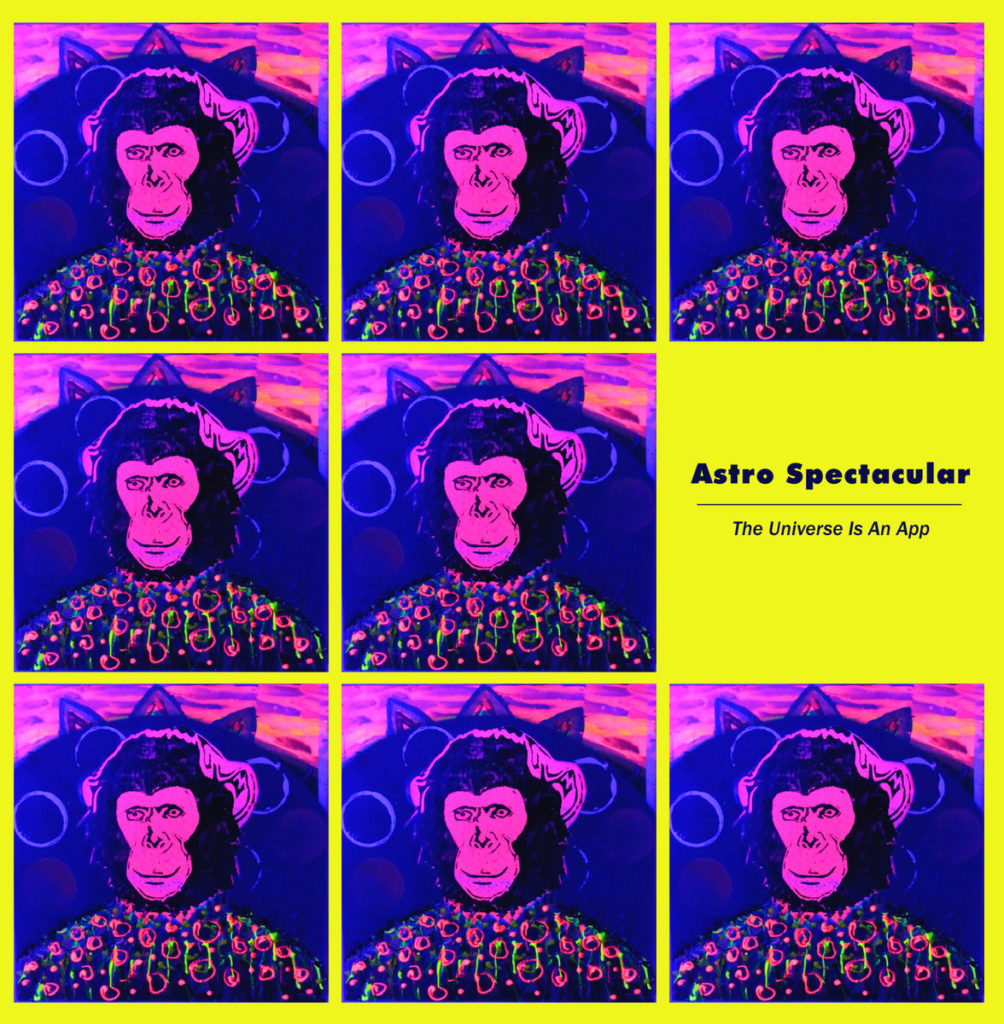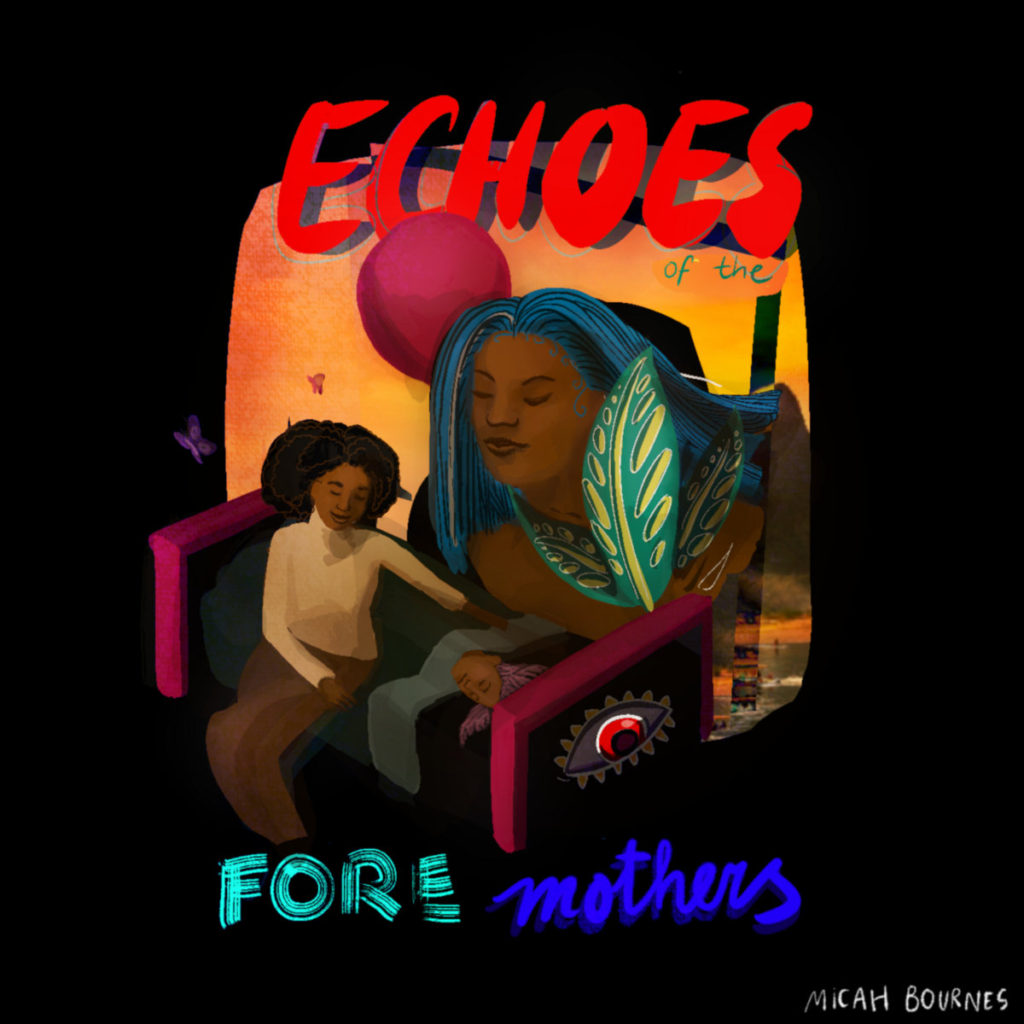FORTHE’s Bandcamp Picks: January 2021
17 minute readFORTHE’s Bandcamp Picks is a new regular series highlighting brand new music releases from Long Beach musicians, producers, and bands. This month, our roundup coincides with Bandcamp Friday, which began last spring as part of Bandcamp’s monthly initiative to direct more proceeds to artists in light of the pandemic by waiving its usual 15% service fee for all music purchased that day. That means that on this day, artists will get to keep 100% of proceeds from music sales, minus a small PayPal or card processing fee. In 2021, Bandcamp Friday will continue on the first Friday of every month until May.
Below are our picks from this past month in chronological order of the release date. Please be sure to directly support local musicians via Bandcamp by purchasing their music—it goes a long way.
Astro Spectacular – The Universe Is An App

Released under the fitting new pseudonym, Astro Spectacular, The Universe Is An App is Long Beach singer-songwriter Mooney Starr’s latest contribution to his growing soul catalogue. Featuring stripped down bass and drum lines dubbed with wild instrumental cuts, samples, and breakdowns—plus a good measure of orgasmic moans and grunts—it stays busy. Through the madness, Starr’s eclectic and powerful soul vocals whine and wail and beg and hold and push through. Jungle and industrial moods flow in and out together and apart, and mirror the lyrical critiques of capitalism—its dehumanization of us and its exploitation of the earth. There are the occasional bursts of light, calm, peace; but those aren’t the final notes, as Starr returns again and again to the machinery of labor.
My favorite track, “Pogo & Dolores Reemes,” poignantly narrates several kinds of labor all at once—creative, emotional, sexual, hopeful. “Pogo was a dancer. / He’d twirl for whomever would pay / —and I would pay.” Slowly the labors pile up to bury the increasingly frail protagonist, as Starr’s voice soars: “Now that you’re a star / You’ll go far.”
We asked Starr to provide some more details on the fictional setting: “This song came from a story that I’d begun with the working title ‘My Husband, The Prostitute.’ It’s a story of the saying ‘never fall in love with trade.’ The narrator falls for a married hustler, Pogo, and spends a good portion of his time obsessing over him—the classic codependent relationship. When [Pogo and Dolores’] baby dies due to neglect, they are both taken to jail. The narrator stands by him throughout the ordeal—like going to his arraignment with him and facing the judge. At the height of the story the news media is camped outside of Pogo and Dolores’ home, and when Pogo appears, he yells at the cameras that everything that he ever wanted, which was fame, was now gone. The narrator grabs his hand on live tv and whispers words of support to him. The chorus repeats that no matter the circumstances, Pogo got the notoriety that he deeply craved and in the end is a star.”
– jac
Vincent Mazza – 2015

In his latest release via Long Beach collective/label GRN+GLD, producer Vincent Mazza offers a distilled capsule of sorts from the year 2015. “Due to extreme stress, I suffered a breakdown that resulted in me staying in a psychiatric facility for three days,” Mazza wrote in his artist statement about that year. “My marriage was also dissolving and we ended up separating shortly thereafter, and eventually divorcing. This EP contains all the music I made and (mostly) finished in 2015, apart from a few tweaks I’ve made since.”
Understandably, 2015 is his most emotionally stirring and vulnerable release to date. Mazza—who many of us remember as the guitarist of Long Beach’s longtime favorite band Furcast—takes us on an uncharted 35-minute journey drenched in his signature maximalist and cinematic stylings. Dark, hypnotic, and raw, the opening track “Woozy Hearts” signals a slow spiral into the unknown with an ambient repetition of jarring delay feedback and distorted stutters. Heart-wrenching orchestral melodies meet disruptive industrial hammering in the following tracks, constantly teetering back and forth from the precarious edge.
In 2015, Mazza shines a lone flashlight into the deep recesses of his subconscious, a dark cavernous abyss where the raw energies of suppressed emotions churn and swell. These songs are an act of reckoning, an excavation of loud, unforgiving shadows. Feelings of loneliness, sadness, and existential dread rise to the fore, but there is an undeniable beauty that permeates through the chaos. A deep listen of 2015 is to tread deeply into Mazza’s psyche but into our own as well.
-EK
.rael_one – Ronaraps (Prod. Mjra)

In his newest single, Long Beach rapper .rael_one transfixes his gaze on the politics of COVID-19 and poses some profound questions. To the backdrop of a lo-fi ambient beat with glitched bells and rainfall, .rael_one muses about the pandemic’s corporate beneficiaries and their behind-the-scenes economic manipulation: “All proceeds go to the known suspect of vaccinated patients / awaiting advice for a device of their own creation.” He makes it no secret of his own suspicions of ill-willed meddling at the cost of innocent lives: “For this economy frozen in time / dollaz or die / corporate schemes over lifelines / … while death tolls rise at a rate that’s higher than Vietnam.” With the song just one minute and 38 seconds long but chock full of memorable lines, one can almost hear a mic drop at the end.
-EK
Floods – Louisiana

The sonic poetry of experimental producer Floods is a transfixing delight in his latest EP, a four-track ode to Louisiana. Released on Jan. 22 via GRN+GLD—the Long Beach label/collective of which he is a longtime member—Louisiana explores the polar motifs of control and havoc in the context of nature’s way with its elements.
Tomisin Oluwole
Ode to Pink II, 2020
Acrylic and marker on paper
14 x 22 inches
Click here to check out our interview with Tomisin Oluwole, a a literary and visual artist based in Long Beach.

Instead of gunking up our site with ads, we use this space to display and promote the work of local artists.
Wavering in a slow descent into deeper waters, the opening track “Drowning” begins with an eerie build of slow reversed samples that abruptly give way to several false starts of a pounding kick; disparate elements that never quite materialize into a linear clarity inspire a foreboding anxiety until it all fades into a deep reverberation, a surrender into our perceived fate.
“Attic Leaks” finds its footing in a heavy-footed trap-inspired beat atop a bed of sustained vocal harmonies, striking in its juxtaposition between the eerie beauty of the synth bed and the jarring angular beat that drives the story forward. A recurring melody finally materializes in “Closet Space,” an experimental dubstep track where the call and response between the deep wobbling bass line and stuttering synths finds resolution in a dubby outro. The EP closes out with Floods’ pitched down interpretation of Ciara’s 2012 song “Sorry,” in which all the preceding chaos somehow begins to make sense.
-EK
Colocho & Dokkodo – Colocho & Dokkodo

Anthony Colocho and Jordan Hermosillo (Dokkodo)’s prolific musicianship collectively span a wide variety of Long Beach projects from over the years, including Band of Wizards, Hopeless Romantics, Freeman’s Dead, The Sleeperz, Ego Death Trip, and more. In their most recent collaboration “Colocho & Dokkodo,” the two multi-instrumentalists team up to pay tribute to some of their favorite outlaw country tracks via Classless Records. Currently, two tracks out of six are available: “Ain’t Livin Long Like This,” a country song popularized by Waylon Jennings in 1970, and “Waymore’s Blues,” another song from Jennings pressed in 1975. Colocho and Dokkodo take turns on the mic with a distinct charm shining through each of their voices, and both covers, while giving ode to the spirit of outlaw country, undeniably filter through a twist of Long Beach-bred garage rock.
-EK
Koibito – Dote EP

Through the endlessly generous GRN+GLD collective label, Long Beach duo Koibito has reemerged with their second EP. Released three years to the day of their debut EP Elian, Dote invites us to relax into a journey filled with play, discovery, sensuality, healing, and a sense of returning.
Koibito’s repetitive melodic components resonate as a mantra of sorts continuously revealing layers of possibilities within each cycle of sounds. The title track “Dote” creates an atmosphere in which a gathering of sorts is taking place. Moving parts seamlessly weave together with expansive and alluring flute twirls. The steady harmonies shared between the flute and the synths offer a chance to surrender to that which wants to guide you.
The meows and purrs of “Caturday” coat each guitar riff with an electric curiosity, while “Reishi” reveals new energy through its compelling drum and bass hypnosis and captivating siren calls. “Tempranillo” is a celebration anthem and as the heavier sounds begin to seep through, a merging of worlds is upon us. The Earth plane and the spiritual plane rediscover each other throughout these songs and by the end of your listening experience, the two feel much more connected. The final song, “Mount”, is an epically beautiful send off. Impeccably mastered by Repeated Measures, Dote EP is a meal best served through headphones.
-Alexandra Pagano
Micah Bournes – Echoes of the Foremothers

For Black History Month, Long Beach poet, songwriter, and hip hop artist Micah Bournes followed the call of Audre Lorde’s “A Litany For Survival” and released a litany of poems written by Black women. Echoes of the Foremothers includes Bournes’ spoken word renditions of these pieces, each left to dance pure and whole in the space of the listener’s silence, or lightly brushed like watercolors with echoes or delays. As Bournes writes, “This poetic libation is minimalistic. I wanted to highlight the brilliance of these women by stripping away all other distractions.”
The careful digital overlays—such as those found in the opening piece by Lorde—are powerful, and only help bring out the tenderness of the poems that follow. After ebbing into a few tracks of warm, easy words, the reinforcing, layered vocals emerge again to their appropriate heights in “Homage to Black Madonnas” by Margaret Burroughs: “Venerable black women / You of yesterday, you of today. / Black mothers of tomorrow yet to be / These lines are homage to you, for you.”
The final poem, “Proud Mommas,” is Bournes’ personal addition to the album, and it is strength resolutely basking in strength—inimitable, assuring: “Ain’t no recipe gonna erase your touch.”
Here’s Bournes speaking to us about his purpose with this release: “Echoes was meant to honor all Black foremothers who loved so powerfully in their life and work. Though there are a couple notable names, I didn’t wanna pick poets who were all widely known. I was hoping to highlight the fact that there are so many brilliant women in Black history that most people have never heard of. When it comes to Black American poetry specifically, we got plenty more voices than Langston Hughes and Maya Angelou. I hope this project helps the wisdom of these foremothers echo into the minds and hearts of a few more generations.”
– jac


 editors@forthe.org
editors@forthe.org




